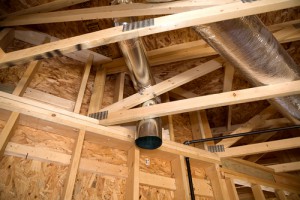The duct system is a series of tubes used to distribute warm or cold air throughout your house. Good ductwork design helps to distribute the air more efficiently. In return, you get better temperature control and money savings on heating and cooling bills. Here's what it takes to help improve the efficiency of your HVAC system with quality ductwork design.

Where to Install
Much of the ductwork design lays in where your duct system is installed. In typical duct systems, 25 to 40 percent of the hot or cold air is lost to leaks when transferring the air to parts of house. That's why efficient ductwork design is so important. That said, even the most efficient ducts can lose about 20 percent of the air from it's HVAC system. How can that be avoided? Many energy efficient homes have ductwork installed in conditioned spaces so any leaks still contribute to the heating or cooling of your home.
Make Current Ducts More Efficient
If you're not planning on installing or re-installing ductwork anytime soon, there are still ways to improve the system. The most simple way to improve the ducts is to find and patch any air leaks. Beyond that, if you find that ducts are in unconditioned spaces, insulating them can make a significant difference in their efficiency. And finally, make sure that any furniture you have isn't blocking any of the return systems.
For more information on ductwork design and what factors contribute to it, contact Rodenhiser Plumbing, Heating & Air Conditioning. Our team of HVAC experts proudly serve the 495/128 area of Massachusetts.
Image via Shutterstock.com